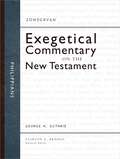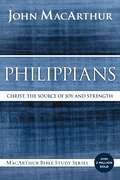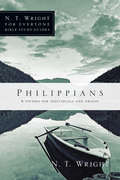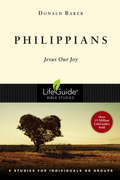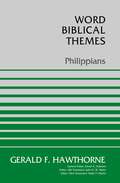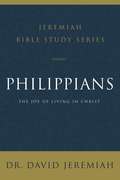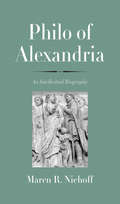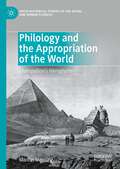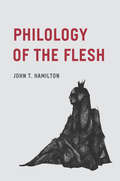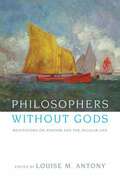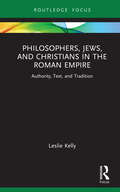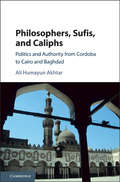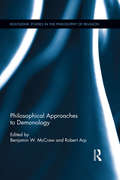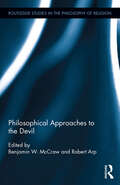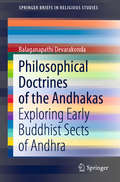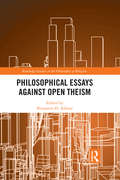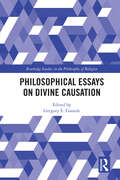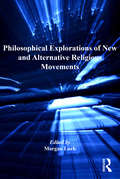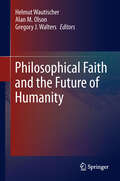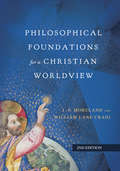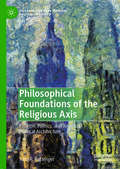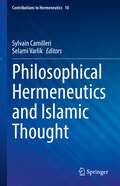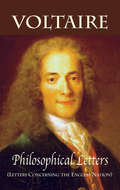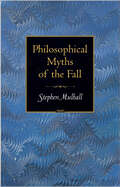- Table View
- List View
Philippians: Christ's People Living in Unity and on Mission (Zondervan Exegetical Commentary on the New Testament)
by George H. GuthrieDesigned for the pastor and Bible teacher, the Zondervan Exegetical Commentary on the New Testament features today's top New Testament scholars and brings together commentary features rarely gathered together in one volume. With careful analysis and interpretation of the Greek text, the authors trace the flow of argument in each New Testament book, giving readers the tools they need to properly understand and communicate the meaning of the text.Commentary on each passage follows a clear structure to help readers grasp the flow and meaning of the text:Literary Context: A brief discussion of how the passage functions in the broader literary context of the book.Main Idea: A one- or two-sentence statement of the big idea or central thrust of the passage.Translation and Graphical Layout: Presents each commentator's translation of the Greek text in a graphical layout to help the reader visualize, and thus better understand, the flow of thought within the text.Structure: Describes the flow of thought in the passage and explains how certain interpretive decisions regarding the relationship of the clauses were made in the passage.Exegetical Outline: The overall structure of the passage is described in a detailed exegetical outline. This will be particularly helpful for those who are looking for a way to concisely explain the flow of thought in the passage in a teaching or preaching setting.Explanation of the Text: Commentators examine words and images, grammatical details, relevant Old Testament and Jewish background to a particular concept, historical and cultural context, important text-critical issues, and various interpretive issues that surface.Theology in Application: The theological message of the passage is summarized. The author discusses the theology of the text in terms of its place within the book and in a broader biblical-theological context. Finally, each commentator provides some suggestions on what the message of the passage is for the church today.The Zondervan Exegetical Commentary on the New Testament series is the go-to resource for pastors and Bible teachers looking for deep but accessible study that equips them to connect the needs of Christians today with the biblical text.
Philippians: Christ, the Source of Joy and Strength (MacArthur Bible Studies)
by John F. MacArthurCircumstances... They are not all they're cracked up to be. For instance, Paul wrote his letter to the Philippians from a Roman prison cell, yet despite those dire circumstances, his major theme in the letter was joy How did Paul find joy in a Roman prison cell? He didn't! He took his joy in Christ into jail with him. Paul's circumstances did not dictate his attitude. In this letter, he demonstrated several life attitudes that were shocking in their audacity and counter intuitiveness:Rejoice in the Lord, alwaysLiving means living for Christ, and dying is even betterThink of others as better than yourselvesWhatever things were gain, count them as lossYou can do all things through Christ who strengthens you!—ABOUT THE SERIES—The MacArthur Bible Study series is designed to help you study the Word of God with guidance from widely respected pastor and author John MacArthur. Each guide provides intriguing examinations of the whole of Scripture by examining its parts and incorporates:Extensive, but straight-forward commentary on the text.Detailed observations on overriding themes, timelines, history, and context.Word and phrase studies to help you unlock the broader meaning and apply it to your life.Probing, interactive questions with plenty of space to write down your response and thoughts.
Philippians: Ephesians, Philippians, Colossians, And Philemon (N. T. Wright for Everyone Bible Study Guides)
by N. T. Wright Sandy Larsen Dale LarsenThings don't always go the way we intend. It's easy to feel discouraged because what we hope for is badly thwarted, or because people make life difficult. Paul, writing to the Philippians from prison, certainly knew what it was like to have plans interrupted. But he maintains robust confidence in God's overruling power, even when everything seems to be going wrong. These eight studies will help us learn from Paul the art of seeing God's purposes working out through problems and difficulties, and will deepen our own confidence in God's power.
Philippians: Jesus Our Joy (LifeGuide® Bible Studies)
by Donald BakerIt's easy to be happy when things go well for you. But what would it be like to have a sense of joy that continued even in times of trouble? Such was the deep joy that the apostle Paul experienced--even in prison. His contentment was neither dependent on circumstances nor changed by difficulty. In his brief letter to the Philippians, Paul will show you too how to live joyfully in every situation.
Philippians: Revised Edition (Word Biblical Themes #Vol. 43)
by Gerald F. HawthorneA companion series to the acclaimed Word Biblical CommentaryFinding the great themes of the books of the Bible is essential to the study of God's Word and to the preaching and teaching of its truths. These themes and ideas are often like precious gems: they lie beneath the surface and can only be discovered with some difficulty. While commentaries are useful for helping readers understand the content of a verse or chapter, they are not usually designed to help the reader to trace important subjects systematically within a given book a Scripture.The Word Biblical Themes series helps readers discover the important themes of a book of the Bible. This series distills the theological essence of a given book of Scripture and serves it up in ways that enrich the preaching, teaching, worship, and discipleship of God's people. Volumes in this series:Written by top biblical scholarsFeature authors who wrote on the same book of the Bible for the Word Biblical Commentary seriesDistill deep and focused study on a biblical book into the most important themes and practical applications of themGive reader&’s an ability to see the "big picture" of a book of the Bible by understanding what topics and concerns were most important to the biblical writersHelp address pressing issues in the church today by showing readers see how the biblical writers approached similar issues in their dayIdeal for sermon preparation and for other teaching in the church Word Biblical Themes are an ideal resource for any reader who has used and benefited from the Word Biblical Commentary series, and will help pastors, bible teachers, and students as they seek to understand and apply God&’s word to their ministry and learning.
Philippians: The Joy of Living in Christ (Jeremiah Bible Study Series)
by Dr. David JeremiahExperience joy in any situation...Follow Dr. Jeremiah through the letter of Philippians in a chapter-by-chapter study that will help you understand what it meant to the people at the time it was written, and what it means to Christians today. The believers in Philippi were experiencing both concern for Paul while he was in prison and spiritual discouragement. Paul wrote this loving letter to encourage them in their faith and to remind them that there was a greater future in store for him and for them outside this world. Paul even admits the tension he feels between living to continue sharing the gospel and dying so he can be with Christ. This mindset allowed Paul to remain joyful in the midst of suffering and he knew the same would be true of the Philippi believers as well.Each of this study's twelve lessons is clearly organized to include:Getting Started: An opening question to introduce you to the lesson.Setting the Stage: A short reflection to explain the context of the study.Exploring the Text: The Scripture reading for the lesson with related study questions.Reviewing the Story: Questions to help you identify key points in the reading.Applying the Message: Questions to help you apply the key ideas to their lives.Reflecting on the Meaning: A closing reflection on the key teachings in the lesson.—ABOUT THE SERIES—The Jeremiah Bible Study Series captures Dr. David Jeremiah's forty-plus years of commitment in teaching the Word of God. In each study, you'll gain insights into the text, identify key stories and themes, and be challenged to apply the truths you uncover to your life. By the end of each study, you'll come away with a clear and memorable understanding of that Bible book.Each study also contains a Leader's Guide.
Philo of Alexandria: An Intellectual Biography
by Maren R. NiehoffPhilo was a Hellenistic Jewish philosopher who left behind one of the richest bodies of work from antiquity, yet his personality and intellectual development have remained a riddle. Maren Niehoff presents the first biography of Philo, arguing that his trip to Rome in 38 CE was a turning point in his life. There he was exposed not only to new political circumstances but also to a new cultural and philosophical environment. Following the pogrom in Alexandria, Philo became active as the head of the Jewish embassy to Emperor Gaius and as an intellectual in the capital of the empire, responding to the challenges of his time and creatively reconstructing his identity, though always maintaining pride in the Jewish tradition. Philo’s trajectory from Alexandria to Rome and his enthusiastic adoption of new modes of thought made him a key figure in the complex negotiation between East and West.
Philology and the Appropriation of the World: Champollion’s Hieroglyphs (Socio-Historical Studies of the Social and Human Sciences)
by Markus MesslingThis book sheds new light on the work of Jean-François Champollion by uncovering a constellation of epistemological, political, and material conditions that made his decipherment of Egyptian hieroglyphs possible. Champollion’s success in understanding hieroglyphs, first published in his Lettre à M. Dacier in 1822, is emblematic for the triumphant achievements of comparative philology during the 19th Century. In its attempt to understand humanity as part of a grand history of progress, Champollion’s conception of ancient Egypt belongs to the universalistic aspirations of European modernity. Yet precisely because of its success, his project also reveals the costs it entailed: after examining and welcoming acquisitions for the emerging Egyptian collections in Europe, Champollion travelled to the Nile Valley in 1828/29, where he was shocked by the damage that had been done to its ancient cultural sites. The letter he wrote to the Egyptian viceroy Mehmet Ali Pasha in 1829 demands that excavations in Egypt be regulated, denounces European looting, and represents perhaps the first document to make a case for the international protection of cultural goods in the name of humanity.
Philology of the Flesh
by John T. HamiltonAs the Christian doctrine of Incarnation asserts, “the Word became Flesh.” Yet, while this metaphor is grounded in Christian tradition, its varied functions far exceed any purely theological import. It speaks to the nature of God just as much as to the nature of language. In Philology of the Flesh, John T. Hamilton explores writing and reading practices that engage this notion in a range of poetic enterprises and theoretical reflections. By pressing the notion of philology as “love” (philia) for the “word” (logos), Hamilton’s readings investigate the breadth, depth, and limits of verbal styles that are irreducible to mere information. While a philologist of the body might understand words as corporeal vessels of core meaning, the philologist of the flesh, by focusing on the carnal qualities of language, resists taking words as mere containers. By examining a series of intellectual episodes—from the fifteenth-century Humanism of Lorenzo Valla to the poetry of Emily Dickinson, from Immanuel Kant and Johann Georg Hamann to Friedrich Nietzsche, Franz Kafka, and Paul Celan—Philology of the Flesh considers the far-reaching ramifications of the incarnational metaphor, insisting on the inseparability of form and content, an insistence that allows us to rethink our relation to the concrete languages in which we think and live.
Philosopher's Notes on: The Bhagavad Gita
by Eknath Easwaran Brian JohnsonPhilosophers Notes on: The Bhagavad Gita Translated and Edited by Eknath Easwaran. The essential points are condensed for more wisdom in less time.
Philosophers without Gods: Meditations on Atheism and the Secular Life
by Louise M. Antony editorAtheists are frequently demonized as arrogant intellectuals, antagonistic to religion, devoid of moral sentiments, advocates of an "anything goes" lifestyle. Now, in this revealing volume, nineteen leading philosophers open a window on the inner life of atheism, shattering these common stereotypes as they reveal how they came to turn away from religious belief. These highly engaging personal essays capture the marvelous diversity to be found among atheists, providing a portrait that will surprise most readers. Many of the authors, for example, express great affection for particular religious traditions, even as they explain why they cannot, in good conscience, embrace them. None of the contributors dismiss religious belief as stupid or primitive, and several even express regret that they cannot, or can no longer, believe. Perhaps more important, in these reflective pieces, they offer fresh insight into some of the oldest and most difficult problems facing the human mind and spirit. For instance, if God is dead, is everything permitted? Philosophers without Gods demonstrates convincingly, with arguments that date back to Plato, that morality is independent of the existence of God. Indeed, every writer in this volume adamantly affirms the objectivity of right and wrong. Moreover, they contend that secular life can provide rewards as great and as rich as religious life. A naturalistic understanding of the human condition presents a set of challenges--to pursue our goals without illusions, to act morally without hope of reward--challenges that can impart a lasting value to finite and fragile human lives. Collectively, these essays highlight the richness of atheistic belief--not only as a valid alternative to religion, but as a profoundly fulfilling and moral way of life.
Philosophers, Jews, and Christians in the Roman Empire: Authority, Text, and Tradition (Routledge Focus on Classical Studies)
by Leslie KellyThis book explores how philosophical and religious communities in the Roman Empire of the first and second centuries CE engaged with, and were shaped by, their relationship to texts and tradition in their quest for true religious knowledge or ultimate truth.This era was a dynamic transition period for philosophers, Jews, and Christians in the Roman Empire: it was the stage between Hellenistic philosophy and the Neoplatonism of Late Antiquity; the end of Second Temple Judaism and the start of the rabbinic period; Christianity’s rapid growth and transformation into an institutional and uniform church. Philosophers, Jews, and Christians utilized similar strategies for communal identity and boundarymarking and reinterpreted ancient traditions in creative ways to create new centers of authority. An intellectual literary culture fostered a focus on texts as a locus of contention, conversion, and exchange within and between groups. The book surveys and compares these groups as three distinct textual or reading communities, analyzing their practices of textual engagement and parallel attitudes towards textual authority in this period.This book is suitable for students and scholars working on ancient philosophy in the Roman Empire, classicists, and scholars of early Christianity and Judaism in this period.
Philosophers, Sufis, and Caliphs: Politics and Authority from Cordoba to Cairo and Baghdad
by Akhtar Ali HumayunWhat was the relationship between government and religion in Middle Eastern history? In a world of caliphs, sultans, and judges, who exercised political and religious authority? In this book, Ali Humayun Akhtar investigates debates about leadership that involved ruling circles and scholars of jurisprudence and theology. At the heart of this story is a medieval rivalry between three caliphates: the Umayyads of Cordoba, the Fatimids of Cairo, and the Abbasids of Baghdad. In a fascinating revival of Late Antique Hellenism, Aristotelian and Platonic notions of wisdom became a key component of how these caliphs debated their authority as political leaders. By tracing how these political debates impacted the theological and jurisprudential scholars and their own conception of communal guidance, Akhtar offers a new picture of premodern political authority and the connections between Western and Islamic civilizations. It will be of use to students and specialists of the premodern and modern Middle East.
Philosophical Approaches to Demonology (Routledge Studies in the Philosophy of Religion)
by Robert Arp Benjamin W. McCrawIn contradistinction to the many monographs and edited volumes devoted to historical, cultural, or theological treatments of demonology, this collection features newly written papers by philosophers and other scholars engaged specifically in philosophical argument, debate, and dialogue involving ideas and topics in demonology. The contributors to the volume approach the subject from the perspective of the broadest areas of Western philosophy, namely metaphysics, epistemology, logic, and moral philosophy. The collection also features a plurality of religious, cultural, and theological views on the nature of demons from both Eastern and Western thought, in addition to views that may diverge from these traditional roots. Philosophical Approaches to Demonology will be of interest to philosophers of religion, theologians, and scholars working in philosophical theology and demonology, as well as historians, cultural anthropologists, and sociologists interested more broadly in the concept of demons.
Philosophical Approaches to the Devil (Routledge Studies in the Philosophy of Religion)
by Benjamin W. McCraw & Robert ArpThis collection brings together new papers addressing the philosophical challenges that the concept of a Devil presents, bringing philosophical rigor to treatments of the Devil. Contributors approach the idea of the Devil from a variety of philosophical traditions, methodologies, and styles, providing a comprehensive philosophical overview that contemplates the existence, nature, and purpose of the Devil. While some papers take a classical approach to the Devil, drawing on biblical exegesis, other contributors approach the topic of the Devil from epistemological, metaphysical, phenomenological, and ethical perspectives. This volume will be relevant to researchers and scholars interested in philosophical conceptions of the Devil and related areas, such as philosophers of religion, theologians, and scholars working in philosophical theology and demonology.
Philosophical Doctrines of the Andhakas: Exploring Early Buddhist Sects of Andhra (SpringerBriefs in Religious Studies)
by Balaganapathi DevarakondaThis book provides a comprehensive account on the doctrines of the Andhakas, an early Buddhist sect. It explores how cosmopolitan character of Buddhism is nurtured by the Andhakas. Moreover, it shares key insights into the coherent system of Buddhist philosophical doctrines of the Andhakas on the basis of the Kathāvatthu, enabling readers to gain a better understanding of the doctrinal developments that took place during this period. Divided into four chapters, the book offers broad coverage of the Andhakas, making it of interest to researchers focusing on early Buddhism, as well as general readers who want to learn more about Buddhist philosophy and studies on Andhra.
Philosophical Essays Against Open Theism (Routledge Studies in the Philosophy of Religion)
by Benjamin H. ArbourThis new collection of philosophically rigorous essays critiques the interpretation of divine omniscience known as open theism, focusing primarily on philosophically motivated open theism and positing arguments that reject divine knowledge of future contingents in the face of the dilemma of freedom and foreknowledge. The sixteen new essays in this collection, written by some of the most renowned philosophers on the topic of divine providence, represent a philosophical attempt to seriously consider open theism. They cover a wide variety of issues, including: the ontology of time, systematic metaphysics, perfect being theology, the Christian doctrine of the Incarnation, the problem of evil, and the nature of divine knowledge in general. Philosophical Essays Against Open Theism advances the discussion by wrestling against the assertions of open theism, and will be of interest to both proponents and opponents of this controversial issue.
Philosophical Essays on Divine Causation (Routledge Studies in the Philosophy of Religion)
by Gregory E. GanssleThis book discusses various aspects of God’s causal activity. Traditional theology has long held that God acts in the world and interrupts the normal course of events by performing special acts. Although the tradition is unified in affirming that God does create, conserve, and act, there is much disagreement about the details of divine activity. The chapters in this book fruitfully explore these disagreements about divine causation. The chapters are divided into two sections. The first explores historical views of divine causal activity from the Pre-Socratics to Hume. The second section addresses a variety of contemporary issues related to God’s causal activity. These chapters include defenses of the possibility of special acts of God, proposals of models of divine causation, and analyses of divine conservation. Philosophical Essays on Divine Causation will be of interest to researchers and graduate students working in philosophy of religion, philosophical theology, and metaphysics.
Philosophical Explorations of New and Alternative Religious Movements
by Morgan LuckPhilosophy of religion is focused chiefly on theism. Yet there are a growing number of new and alternative religious movements that would also benefit from philosophical scrutiny. This book is the first collection of philosophical essays, by a team of international authors, focusing on new and alternative religious movements. The book begins with an examination of the definition of new religious movements, before offering an introduction to, and an analysis of, core beliefs held by particular movements, including: Scientology, Raelianism, Siddha Yoga, the Arica School, the Church of the Latter Day Saints (Mormonism), Pantheism, Digital Theology, New Atheism, and the Word of Faith movement. Contributors offer an analysis of one or more of the core tenets of the religious movement, providing readers with both an insight into the group, and the methodology of philosophy of religion.
Philosophical Faith and the Future of Humanity
by Helmut Wautischer Alan M. Olson Gregory J. WaltersKarl Jaspers, who died in 1969, had a profound impact on 20th-century theology and philosophy. His central thesis called for, among other things, a de-centering of philosophy from its Eurocentric roots and a renewal of its dialogue with other traditions, especially Asian ones. This collection of essays includes unpublished work by Jaspers himself as well as testimonies to his life and career by colleagues, associates, and translators, some of who knew Jaspers personally. Readers will also find commentary and interpretation by researchers who have explored Jaspers' work for decades, and a biographical account of Jaspers' student Leonard Ehrlich, who handled much of Jaspers' English translation. The book interrogates Jaspers' conceptions of 'philosophical faith', his philosophy of communication, and the prospects for world philosophy in the future. Focusing on philosophical faith, it assesses Jaspers' interpretations of key philosophers such as Kant, Hegel, Schelling, Kierkegaard, Nietzsche, and Rosenzweig, as well as examining his personal relationships with Bultmann and Heidegger. Contributors also look at Jaspers' philosophies of religion and history, his hypothesis of the 'axial age' (Achsenzeit), and his contributions to metaphysics, periechontology, and economics. Finally, chapters cover Jaspers' philosophy of communication and world history. The latter are informed by a burgeoning interest in Kantian 'Freiheitphilosophie' that influenced Jaspers, as well as concerns over the future of humanity. These concerns in part account for Jaspers' growing popularity in the Middle East, Eastern Europe, Central/South America, and Asia. Also included are lucid clarifications of the difference between religious and philosophical faith, and the relevance of certainty, trust, and communication for a future of mankind. Trained as a psychiatrist, Jaspers practiced this profession before becoming a philosopher and thus had a keen insight into the workings of the human mind even as he challenged the philosophical establishment of his time. It is perhaps this depth to his background that adds to the contemporary relevance of his work.
Philosophical Foundations for a Christian Worldview
by J. P. Moreland William Lane CraigNow updated and expanded in this second edition, Philosophical Foundations for a Christian Worldview by J. P. Moreland and William Lane Craig offers a comprehensive introduction to philosophy from a Christian perspective. In their broad sweep they seek to introduce readers to the principal subdisciplines of philosophy, including epistemology, metaphysics, philosophy of science, ethics, and philosophy of religion. They do so with characteristic clarity and incisiveness. Arguments are clearly outlined, and rival theories are presented with fairness and accuracy. Philosophy, they contend, aids Christians in the tasks of apologetics, polemics, and systematic theology. It reflects our having been made in the image of God, helps us to extend biblical teaching into areas not expressly addressed in Scripture, facilitates the spiritual discipline of study, enhances the boldness and self-image of the Christian community, and is requisite to the essential task of integrating faith and learning. Here is a lively and thorough introduction to philosophy for all who want to know reality. This second edition now includes including enhanced arguments, updated bibliographies, and new chapters on atonement and the mind-body problem.
Philosophical Foundations of the Religious Axis: Religion, Politics, and American Political Architecture (Palgrave Studies in Religion, Politics, and Policy)
by John R. PottengerThis book discusses the evolution of three philosophical foundations from the twelfth through the eighteenth centuries that converged to form the basis of liberal democracy’s approach to the place and role of religion in society and politics. Identified by the author as a “religious axis,” the period of convergence promoted rational and empirical investigation, enabled the development of diverse religious beliefs, and affirmed religious liberty and expressions amidst pluralist politics. The author shows that the religious axis’ three philosophical foundations—epistemic, axiological, and political—undergird the political architecture of American liberal democracy that designed a containment structure to protect a vast array of religious expressions and encourage their presence in the public square. Moreover, the structure embodied a democratic ethos that drives religious and political pluralism—but within limits. The author argues that this containment structure has paradoxically ignited frenzied fires of faith that politically threaten the structure’s own limits.
Philosophical Hermeneutics and Islamic Thought (Contributions to Hermeneutics #10)
by Sylvain Camilleri Selami VarlikThis book investigates the methodological issues raised by the encounter between Islamic thought and contemporary philosophical hermeneutics. It features essays that examine why and how current Muslim thinkers refer to Continental philosophy. The contributors put the universality of the hermeneutic order to the test with three different approaches. The first looks at exegetical aspects. It addresses contemporary thinkers from the Islamicate world who have engaged critically or not with main representatives or key concepts of philosophical hermeneutics. The second presents an interpretative analysis. The essays here present attempts at using philosophical hermeneutics in order to develop new interpretations of canonical or traditional ensembles of texts such as the Qur’an and the Hadith as well as legal, spiritual, and philosophical corpuses from the Islamicate world. The third looks at different political and critical issues. The clear and sound reference to religion of Islamic thought makes its entanglement with philosophical hermeneutics a burning challenge for all parties involved. Is it true, as some contend, that philosophical hermeneutics can help interpret Islamic thought anew? This book reveals how the two philosophies are likely to expand each other’s horizons and influence each other’s conceptual frameworks. It features revised papers from an International Conference.
Philosophical Letters: Letters Concerning the English Nation (Thrift Edition Ser.)
by VoltaireBest known for his philosophical novel Candide, Voltaire ranked among the leading intellectuals of the Enlightenment period. His two-and-a-half-year sojourn in England left a profound impression, and these letters—written as though explaining English society to a French friend—focus on the country's religion and politics, with commentaries on Quakers, the Church of England, Presbyterians, Anti-Trinitarians, Parliament, the government, and commerce. They also include essays on Locke, Descartes, and Newton. Voltaire was much influenced by English tolerance, and his observations on the subject sounded a revolutionary note among European readers that resonated for long afterward. First published in English in 1733, Philosophical Letters was condemned by the French government as "likely to inspire a license of thought most dangerous to religion and civil order." It remains a landmark of the Age of Reason.
Philosophical Myths of the Fall (Princeton Monographs in Philosophy #18)
by Stephen MulhallDid post-Enlightenment philosophers reject the idea of original sin and hence the view that life is a quest for redemption from it? In Philosophical Myths of the Fall, Stephen Mulhall identifies and evaluates a surprising ethical-religious dimension in the work of three highly influential philosophers--Nietzsche, Heidegger, and Wittgenstein. He asks: Is the Christian idea of humanity as structurally flawed something that these three thinkers aim simply to criticize? Or do they, rather, end up by reproducing secular variants of the same mythology? Mulhall argues that each, in different ways, develops a conception of human beings as in need of redemption: in their work, we appear to be not so much capable of or prone to error and fantasy, but instead structurally perverse, living in untruth. In this respect, their work is more closely aligned to the Christian perspective than to the mainstream of the Enlightenment. However, all three thinkers explicitly reject any religious understanding of human perversity; indeed, they regard the very understanding of human beings as originally sinful as central to that from which we must be redeemed. And yet each also reproduces central elements of that understanding in his own thinking; each recounts his own myth of our Fall, and holds out his own image of redemption. The book concludes by asking whether this indebtedness to religion brings these philosophers' thinking closer to, or instead forces it further away from, the truth of the human condition.
